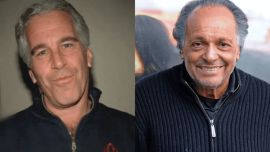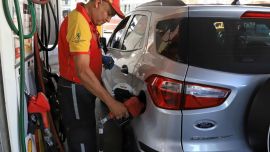One of the not-so-great things about being a foreign-born journalist in this marvellous country is being asked on a regular basis why I’m still living here. Whether it’s a friend, colleague, new acquaintance or even taxi-driver, the question keeps coming, year after year, day after day.
My regular answer, as a working reporter, is that when it comes to news, nowhere beats Argentina. And I’ve got the proof to illustrate it: it comes in the form of a simple narrative exercise that I’ve enjoyed playing with my friends here in recent weeks. Let’s have a go.
Think back to November 22, 2015, the night Mauricio Macri faced Daniel Scioli in a presidential run-off to win the Casa Rosada. What would you have said at the time if I told you at the time that the PRO leader would secure a thin majority that night and win the Presidency, before embarking on an unsuccessful plan of gradualism and end his term with the largest loan from the International Monetary Fund in global history? What would you have said if I’d foretold that Cristina Fernández de Kirchner would then return from the cold to the frontline of politics four years later as none other than Alberto Fernández’s vice-president, that we’d go through a huge global pandemic featuring a year-long lockdown due to a killer virus, suffer a huge economic collapse and recover and that a gang of “candyfloss killers” would attempt to assassinate Fernández de Kirchner as she stood trial for corruption? What would you have said if I’d added that Argentina would go on to win the FIFA World Cup in Qatar and bring five million partygoers onto the streets, and that eight years after Cambiemos took the election, an unknown libertarian economist named Javier Milei would (potentially) go on to win the next presidential election and defeat the main parties, with Macri allegedly planning to help smooth the transition behind the scenes?
Be honest. You’d think I was nuts, right? Or perhaps you would think it was entirely possible because this is Argentina – and anything can happen.
The long and the short of this is, there is no way of predicting what is to come on Sunday. Unpredictability reigns – the fact that the ruling coalition’s candidate is still in with a chance given the country’s economic indicators (40 percent poverty, 138 percent inflation, recession on the way) is, in and of itself, quite bizarre.
After the failure of pollsters to predict the results of the PASO primaries and the lack of faith in them today, this is the situation we find ourselves in today, on October 21, 2023, one day before Argentina goes to the polls for, as Milei himself described it last Wednesday night, is potentially “the most important vote in 100 years.”
—
Sticking to the legal limits laid out by Argentina’s sweeping electoral curfew or veda (which, let’s be frank, belong to the last century, given the impact of social media and its limitless capacity to transmit information from and to anywhere in the world), let’s focus on a few key narratives and themes from the long road to the Casa Rosada thus far.
To start, why is this election so important? Well, for a start, there’s the state of the crisis. Argentina is at a crossroads not just politically but economically. As many an analyst has observed, all three main candidates (Milei, Sergio Massa and Patricia Bullrich) are positing paths (in lip-service, at least) that lean towards ‘fiscal order.’ The real question is just how quick the “adjustments” will take and the pace of them – a huge issue for all of us, especially those finding themselves increasingly closer to the breadline.
Second, there is a new candidate that has reshaped the political landscape. The emergence of Milei as a national figure has put Argentina’s traditional power-brokers on the back foot. Voters in traditional Peronist strongholds are being seduced by the libertarian pitch, Bullrich has been outflanked by someone more controversial than her and all the candidates are struggling to match the sheer controversy and column inches generated every time Milei gets near a microphone. They, however, are playing a different game – what was once a gaffe for a mainstream politician barely makes an impact on the libertarian’s voting intentions. We are in a new era – and Milei and his gang aren’t going anywhere soon.
Third, this election, if it is not won by Bullrich, has to go down as a huge failure for the opposition Juntos por el Cambio coalition. Presented with as much of an open goal as you can get in politics – those damning economic indicators once again and a weary population eager to vote for change – their inability to line up behind a single candidate could cost them dearly. The damning indictment of Horacio Rodríguez Larreta's candidacy underlines that the shiny branded yellow of the coalition's carefully marketed strategies have failed to connect with an electorate seeking authenticity and answers.
Fourth, the purity of anger, of rejection, of bronca. The failure of Argentina's economic model over the past decades, as so many have already written, has reignited rage against the political class, chorusing nicely with his condemnation of the "caste." Some argue that it is Milei's liberalism that delivered the spark, but the lack of many of his voters to understand the policies he proposes cuts this theory down in its tracks. The wild-eyed economist is riding a wave of fury and his potent mix of liberalism, condemnation and controversy has caught the attention of the public, or at least a third of it. More if you include the ire behind the vote dedicated to Bullrich.
Fifth and final for now, there’s the not-so-small issue of democracy. The irony that the 40th anniversary of its return to Argentina could be marked by an election in which a figure like Victoria Villarruel, who has spent much of the past few decades playing down and justifying the abuses of the military during the era of state terrorism, should serve as a warning. As should the declarations from some candidates that rights may be curtailed in the face of social unrest in order to allow the country to “function.” These are not easy steps to walk back from and raise the question as to whether state policies of memory, truth and justice have been politicised and failed. Nevertheless, it speaks volumes that there are no true fears about electoral fraud or a less-than-peaceful transition, conversations that are now so regular in so many democracies worldwide.
—
Another working (cod-psychology) thesis I have about Argentina is that it is the recurrent crises and economic meltdowns that makes the country so special. The constant need to look for solutions, quick fixes and workarounds fosters the incredible creativity and improvisational brilliance that runs so many people in this country. For me, it’s the spark that creates the conditions for a Jorge Luis Borges, Julio Cortazar, Marta Minujín, Diego Maradona or Lionel Messi to emerge.
Perhaps this desire for the quick fix is leading many down the garden path? The policies that Milei proposes will be far from quick to implement even if he does take office and will be difficult to pass into law given his likely lack of congressional support. The silver bullet to resolve the nation’s economic ills is non-existent and even Milei knows this. The reality is that democracy is often ugly and negotiated. It often involves solutions that no party is truly happy with.
Where we’re going will be decided tomorrow, by you and millions of others at the ballot-box. If we are to get through it all, we’ll have to work together – and perhaps rely on a little of that inspirational Argentine magic to get us through.
One thing’s for sure: wherever we’re going, it definitely won’t be boring.





















Comments